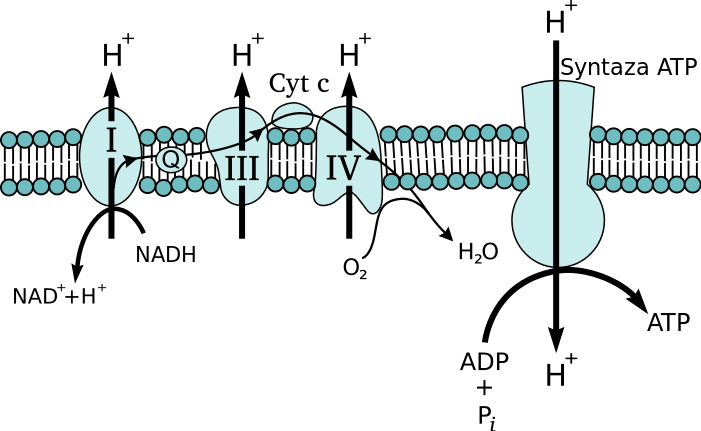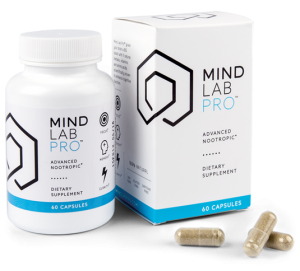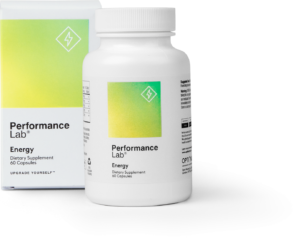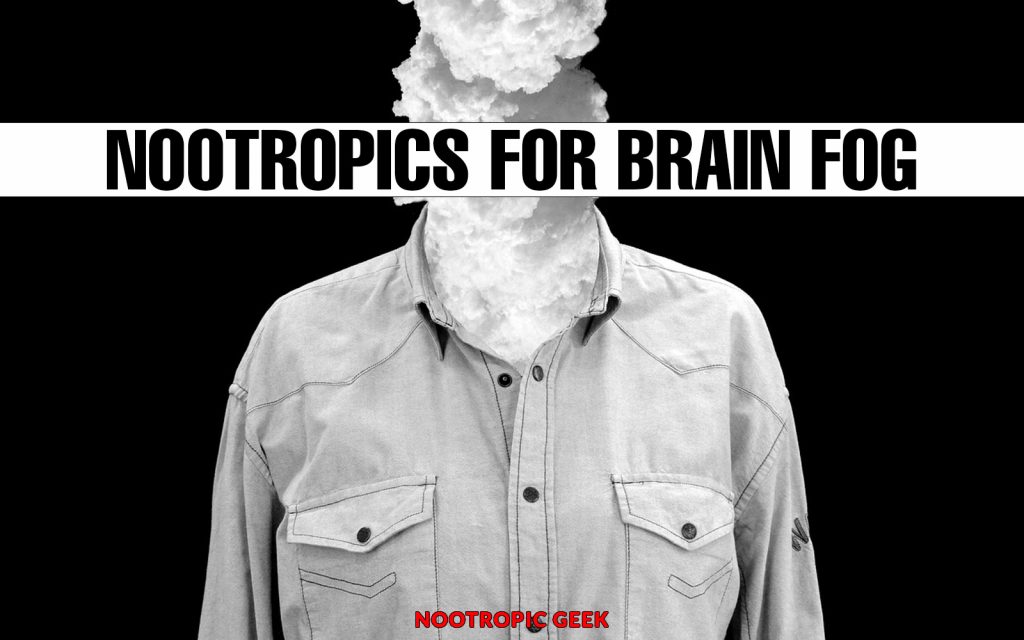Summary: Nootropics for Brain Fog
Clear thinking is great. The opposite, brain fog, is not. Various factors may contribute to brain fog, most notably low energy, sleep deprivation, stress, and poor nutrition. Lifestyle changes in the sleep, diet, and exercise categories are the first place to start in combating brain fog. Yet, as we age, brain fog becomes more of a common thing, and so it’s not a bad idea to seek a little nootropic intervention — particularly brain energizing nootropics — for help. The nootropics I cover here include Rhodiola rosea, Citicoline, L-Tyrosine + B-Vitamins, NADH, ALCAR, and Ginkgo biloba.
Page Contents
Restore and Recharge for Clearer Thinking
Foggy hills and mountains are things of beauty. Yet, a fog-filled brain is absolutely not beautiful. (Although, to be fair, I’ve never actually seen a foggy brain; only felt it… and it sucks!) When brain fog strikes, thoughts go missing, memories become muddled, motivation and mood shrink… Essentially, all of types of thinking become way harder than they need to be. Yet, fortunately, nootropics for brain fog may help clear things up.
But first: What exactly is brain fog?
What does brain fog feel like? Where does brain fog come from? WHY is brain fog?? WHY IS ANYTHING?!?
Unfortunately, I don’t have enough time to answer that last question, but I’ll guide you through the first few questions and then some as we read up on nootropics for brain fog, as well as the best nootropic supplements for mental clarity. OMGOMGOMG I’m so excited — let’s get started.
What is Brain Fog?
While the term “brain fog” is a bit of a metaphor (i.e., there’s no actual fog or mist wrapping your brain), it’s a pretty dead-on description of the experience. In the same way that foggy weather disrupts visual clarity, brain fog obscures clarity of thought. Temporary, transient states of poor memory, attention, executive function, processing speed, and other mild cognitive impairments have been associated with brain fog.
Yet, perhaps the reason we resort to colloquial metaphor in naming the experience “brain fog” is because it’s yet to be formally recognized as a medical or psychological condition. Other names for brain fog include brain burnout, brain fatigue, and (my favorite) brain dead:
“Your brain is dead?!”
“Yea, man… sucks.”
Emphasis needs to be placed on the temporary aspect of brain fog. Unlike clinical ADHD or anxiety, which involve long-term cognitive impairments, brain fog is more like a short-term cognitive interruption. We may as well define the slow, migrainous thinking associated with the hangover as a sort of brain fog.
Yet, not all incidents of fuzzy thinking can be pinned to a distinct cause of raucous behavior. Some brain fog events occur spontaneously (or at least seemingly spontaneous) — and if such events occur frequent enough, then a bit of mental investigation and lifestyle behavioral changes may be in order.
Related: Best Nootropics for Anxiety
What Does Brain Fog Feel Like?
As I suggested earlier, brain fog feels as it sounds: like your head is lost in fog. Thinking becomes the mental equivalent of squinting to see a person among a crowd who all look like the friend you’re supposed to be meeting. Finding the right words or thought processes required for a given task become a task in and of themselves.
Frustration only bolsters the fog, leading to further frustration. And if you’re working on deadlines, then brain fog can lead to a hopeless panic.
Brain fog feels as it sounds: like your head is lost in fog.
However, brain fog symptoms may vary, including impaired:
- Verbal recall
- Short-term (working) memory
- Spatial orientation
- Multitasking
- Focus and attention
- Memory retention (learning)
- Mathematical processing
- Mood and motivation
- Emotional well-being
Aging brings a natural decline in cognitive performance. As we get older, the fog becomes more of a permanent state… which is a terrifying mental image that makes me want to write some awesome death-themed poetry. But… for the average, healthy dood or doodette, brain fog often signifies a mental and/or physical deficiency.
Without further investigation and intervention, frequent brain fog episodes may turn a seemingly short-term inconvenience into a continued, long-term problem, such as chronic fatigue or attention disorders.
The Science of Brain Fog
Because brain fog lacks medical or psychological recognition, the science of brain fog is somewhat skimpy and ill-defined. While we’re reasonably familiar with the symptoms of brain fog — poor working memory, creativity, judgment, attention, etc. — the causes and physiological impacts remain… well, foggy.
However, in clinically observed cases of mental burnout, researchers have identified certain anatomical changes that may be associated with the symptoms common to brain fog.
Changes in Brain Structure
Specifically, the brain structures that seem to be affected by brain burnout include:
Prefrontal Cortex
The Prefrontal Cortex (PFC) covers the front part of the brain and seems to be involved in planning and judging complex behaviors, expressions, decisions, and so on. It’s one of the more developed parts of the human brain, controlling much of what makes us, well… behave appropriately in social settings, so to speak. As we age, the PFC naturally thins, contributing to age-related cognitive disorder. However, prolonged mental burnout seems to also contribute to a thinner PFC, regardless of age.
In other words, a burnt out brain possesses a weaker capacity for socially appropriate behavior. The PFC functions for proper judgment and decision-making deteriorate, essentially fogging up your ability to distinguish what is and isn’t important to the task at hand. Here’s my judgment on that: it’s not good.
Amygdala
The Amygdala plays a key role in emotional stability, survival instincts, and memory, namely as it relates to memory. When you think of the amygdala, the word “fear” should come to mind, as this brain organ controls our fear response to certain stimuli. Fear is key to our survival. However, too much fear renders us paralyzed in the face of potential accomplishment. The hero’s journey begins with a venture into the fearful unknown. An overactive amygdala lessens our chances of crossing into the unknown.
And you may have guessed it already: brain burnout contributes to an enlarged amygdala. This may explain the loss of emotional control that often accompanies brain fog and burnout.
Basal Ganglia
Often explored in terms of stress, the sort of mental depletion associated with brain burnout seems to correlate with significant size reductions in the hippocampus, caudate nucleus, and putamen (of the basal ganglia region). Altogether, these brain parts regulate memory and learning, as well as the inhibition of the stress response. A fatigued and/or overworked brain engages excessive release of glutamate, an excitatory neurotransmitter that, under excess conditions, diminishes basal ganglia function. Interestingly, prolonged brain burnout seems to effect a similar impairment on the basal ganglia as an acute traumatic brain injury event.
Chronic Fatigue
Brain fog that lasts for prolonged periods may be classified as Chronic Fatigue Syndrome (CFS), which is defined as: mental and/or physical fatigue for a time greater than 6 months. This type of ongoing brain fog often accompanies other severe health conditions, such as fibromyalgia (FMS). Painful conditions of the body may negatively affect cognition, leading to further mental fatigue, fog, anxiety, and verbal congestion. This highlights one of the weird, complex aspects of brain fog: it doesn’t strictly originate from a cerebral disorder. Certain physical ailments that persist over a long time may contribute to CFS, creating an experience of persistent, perpetual brain fog.
Related: Best Nootropics for ADD/ADHD
How to Clear a Foggy Brain
Go for a long-distance run… yes, do it. Aerobic exercise is actually fantastic for cognitive clarity. And this fact hints at the obvious solutions to brain fog: better sleep, better exercise, better diet. But, of course, you already knew all of that — everyone knows all of that. So, instead, what you want to know is: aside from going on some bullshit run, how can I clear my foggy brain? Easy, what you’ll want to do is find nootropics that enhance the following:
Mitochondrial Energy Output
Caffeine temporarily stimulates the brain, yet follows up with a crash. Nootropics that enhance the function of mitochondria, the body’s primary sources of ATP energy, accomplish the opposite: they improve cellular energy for long-term cognitive function. Nootropics may improve mitochondrial energy output by:
- Reducing mitochondrial oxidative damage
- Transporting raw material for ATP conversion
- Protecting mitochondrial membrane integrity
Better mitochondrial output contributes to healthier natural energy reserves, reducing the risk of brain burnout.
Catecholamine Activity
Excess or prolonged brain activity leads to catecholamine (e.g., dopamine, norepinephrine) depletion. And when catecholamine levels drop off, so does focus, mood, and motivation. Brain burnout kicks in and your work capacity shrinks. Nootropics may benefit catecholamine activity by:
- Supplying catecholamine precursor material
- Assisting with catecholamine conversion processes
- Sharpening catecholamine receptor sensitivity
For short-term catecholamine depletion, catecholaminergic nootropics may help reset the balance.
Stress Resistance
Stress affects damn near everything, including catecholamine levels. In fact, too much stress is one of the key contributors to catecholamine depletion, and thus a primary offender in brain burnout. Adaptogenic nootropics may help bolster the brain and body’s resistances to stress, ameliorating overactive stress responses while also limiting the damages resulting from too much stress.
Due to the broad definition of stress, it’s unrealistic to expect a single adaptogen to completely neutralize the negative effects of stress. However, a smart adaptogen stack may go a long way in helping block a stress response system gone awry.
Cerebral Circulation
When bloodflow to the brain is limited, the brain is limited. As we age, impaired circulation becomes an increasingly greater issue, which leads to other cognitive issues. Proper cerebral circulation ensures that the brain receives enough oxygen and nutrients to function, which is why nootropics that enhance cerebral circulation feel really, really good. Of all the ways that nootropics can assist with defeating brain fog, circulatory boosting noots best accomplish that feeling of “ahh, yes” clarity.
Two common ways that nootropics may improve circulation:
- Increasing vasodilation of blood vessels
- Decreasing the “stickiness” of blood cells
Such nootropics that benefit circulation also may improve athletic performance, as oxygen is a huge component of muscular stamina.
Benefits of Nootropics for Brain Fog
Okay, so the obvious benefit of nootropics for brain is less brain fog… However, with less brain fog comes a number of indirect awesome cognitive improvements, including:
- Better judgment and problem-solving
- More sociable behavior and mood
- Enhanced task-related cognition (or working memory)
- Improved mental stamina
- Quicker, wittier comebacks
That’s right: nootropics that alleviate brain fog improve your comeback game, and I take that very seriously. As a low-key student of Oscar Wilde, I know that having a strong wit can get you a long, long way in life. And so if I’m in any way undermined or insulted, I have to make sure I have quick, clean thinking brain — completely fog-free — so as to respond with a real zinger. Otherwise, I’m exposed and my whole year is ruined.
Best Nootropics for Brain Fog
Rhodiola Rosea
Rhodiola rosea is as much a nootropic as it is a physical performance enhancer. This is due to Rhodiola’s general boost on the brain and body’s adaptive response to stress and fatigue. Often misquoted as an energy booster, Rhodiola is more a fatigue reducer, enhancing alertness and cognitive stamina in the face of foggy tiredness.
Stress is a significant contributor to brain fog and fatigue. In fact, brain fog may be a sure sign that you’re over-stressed/-worked. As one of the premier nootropic adaptogens (a class of herbal nootropics known for their enhancement properties on the body’s ability to adapt to stress), Rhodiola may help limit the negative impacts of stress — be it stress from a mentally demanding assignment or physically intense workout.
In a placebo-controlled clinical study performed on adults suffering from mental fatigue, Rhodiola administration was found to improve:
- Attention and Concentration
- Fatigue Resistance
- Cognitive Test Performance
Rhodiola’s adaptive benefits against mental fatigue were attributed to the herb’s regulatory effects on stress hormone cortisol. Due to cortisol’s role in waking cognition, I view Rhodiola as a great morning cognitive booster — better even than coffee, which arguably overworks the brain and body to exhaustion. If brain fog is a common occurrence for you, I’d recommend taking Rhodiola in the morning for that initial rush of mental clarity, then again later in the day for the keep going motivational boost.
Citicoline
To many nootropic nuts, choline is the foundation to any brain health stack. “Which cholinergic do you use?” I’m often asked when sharing my nootropic geekiness with others. While alpha-GPC is a fantastic choline option, supplying the densest choline concentration that’s able to cross the blood-brain barrier, I prefer Citicoline for its two-part composition of:
- Choline – the precursor compound to acetylcholine, an important neurotransmitter to memory and learning.
- Cytidine – the precursor to uridine, a nootropic nucleotide with significant synaptic plasticity benefits.
Straight-up choline is great for cognitive performance. Yet, the additional cytidine accomplishes further brain boosts by enhancing energy production. It’s a building block nootropic, supplying both the raw material for brain chemicals and brain cell membranes while also increasing the fuel (i.e., energy) supply with which to put the brain in metabolic action.
For the average, healthy user, the benefits of citicoline tend to be memory- and focus-related. However, for the mentally fatigued — or fogged — citicoline’s brain boosts may help mitigate the negative effects of brain burnout by increasing frontal lobe bioenergetics (or brain energy activity).
By directly replenishing the brain, citicoline works very well against brain fog. However, don’t overdo it: my first few goes at citicoline actually increased brain fog, leading to clogged thinking for hours. Start at a smaller dosage, then move up to your peak enhancement zone.
L-Tyrosine + B Vitamins
Rhodiola may lessen brain fog by mitigating the stress hormone response, whereas L-Tyrosine (or N-Acetyl L-Tyrosine) helps alleviate the neurochemical consequences of excess stress. Under conditions of high stress or activity, the brain burns through catecholamine neurotransmitters, such as dopamine, norepinephrine, and epinephrine. Tyrosine, a precursor compound to catecholamines, naturally declines to keep up with the brain’s overactive demands.
When natural tyrosine levels drop off, the brain burns out.
Supplementing L-tyrosine may help alleviate brain fog associated with catecholamine depletion. Or to rephrase that in more practical terms: supplementing L-tyrosine may help alleviate brain fog associated with sleep deprivation, excess stress, physical discomfort (e.g., cold exposure), etc. It’s a unique nootropic amino acid that seems to particularly work under these high stress, high activity conditions. Under normal conditions, you might experience a slight boost in mood and motivation… but not much else.
With that in mind, I consider L-tyrosine as a “clutch performance” nootropic, resorting to this amino when I really need to buckle down with a clear mind to take on whatever assignment that has me stressed in the first place. Sometimes I take it first thing in the morning following a poor night of sleep. Occasionally, I take it midway through my assignment. Always I take it coupled with B vitamins, which are required in the catecholamine conversion processes. (Also, B vitamins assist with cerebral circulation, increasing delivery of oxygen and nutrients to the brain for a better fueled cognition.)
NADH (Nicotinamide Adenine Dinucleotide)
Directly involved in the Mitochondrial Electron Transport Chain (METC), nicotinamide adenine dinucleotide (NADH) plays a key role in mitochondrial ATP energy production across the brain and body. If you remember back to high school biology, ATP is the basic energy unit required by the brain and body to do just about anything.
And because natural NADH levels decline as we age, low NADH seems to be a significant contributor to elderly brain fog and fatigue.

While research on NADH’s nootropic potential is limited, the nootropic use of NADH for brain fog and fatigue makes theoretical sense. At the least, NADH supplements are commonly recommended to people showing symptoms of Chronic Fatigue Syndrome, and the anecdotal evidence of NADH working in these cases seems reasonably promising.
However, if you’re not entirely sold on NADH, it’s not a bad idea to also consider other brain energizing antioxidants, such as PQQ, CoQ10, and (the next entry) ALCAR.
Acetyl-L-Carnitine (ALCAR)
Here’s what the research says: Acetyl-L-Carnitine (ALCAR) enhances cognition mainly for the elderly and heavy drinkers. However, the amino acid’s mitochondrial support may benefit the energy production of others by:
- Improving fatty acid transportation to mitochondria.
- Assisting with waste removal from mitochondria.
Fat burner supplements like ALCAR for the belief that ALCAR supplementation converts fat to energy. In fact, the L-carnitine L-tartrate (LCLT) form seems particularly favored by sculpting bodybuilders for its fat burning potential. However, ALCAR suits the nootropic needs of the mentally fatigued, due to ALCAR’s ability to cross the blood-brain barrier.
You may notice a pattern with all of the brain energizers listed here (NADH, PQQ, CoQ10, ALCAR) in that they all assist mitochondrial energy output. While brain fog isn’t always attributed to poor energy production, it’s often the case that poor energy production is attributed to brain fog. This makes sense: low energy production contributes to tired thinking.
ALCAR supplementation may theoretically help, which is perhaps why it’s such a hugely popular nootropic amino in brain health supplement stacks.
Ginkgo Biloba
Often associated with elderly brain health care, Ginkgo Biloba improves cognitive clarity and performance by dealing with an issue of increased prevalence in older age: poor circulation. As we age, circulatory issues become a problem. When blood flow falters, our energy-demanding brain fails to receive adequate levels of oxygen and nutrients — i.e., brain fuel. Poor cerebral circulation leads to poor cerebral nourishment, a key factor in brain fog.
But how does Ginkgo Biloba boost circulation? Two ways:
- By dilating blood vessels.
- And by reducing the “stickiness” of blood cells.
The increase in blood flow to the brain has a pronounced benefit on cognition, significantly clearing the mind for better, task-related thinking. In fact, the boost on task-related thinking (or working memory) seems benefit younger, healthy users as well as the elderly. For awhile, I lacked appreciation for Ginkgo, as I viewed it as being solely beneficial for the older folk. However, personal experience has found the herb and its extracts useful in clearing my mind prior to a long, thought-provoking assignment — or even prior to exercise.
Best Nootropic Supplements for Brain Fog
One of the nootropics listed above may help defeat brain fog. Combining all of them may work even better. However, these aren’t the only nootropics that help combat brain fog. Really, brain fog may arise due to any number of indirect cognitive impairments. And so my personal policy with regards to defeating brain fog involves taking a daily brain health stack that covers all of the major pathways involved in clear thinking. As far as premade manufactured stacks go, my favorite nootropic supplements for brain fog include:
Mind Lab Pro
 Mind Lab Pro is a high quality, comprehensive brain health stack that covers six key cognitive pressure points towards achieving the ultimate goal of 100% Brainpower. Rather than supplying everything under the sun, Mind Lab Pro focuses on the bare essentials, delivering an impressive “synergy” mix of nootropics that altogether enhance:
Mind Lab Pro is a high quality, comprehensive brain health stack that covers six key cognitive pressure points towards achieving the ultimate goal of 100% Brainpower. Rather than supplying everything under the sun, Mind Lab Pro focuses on the bare essentials, delivering an impressive “synergy” mix of nootropics that altogether enhance:
- Brain Energy
- Neurotransmitters
- Blood Flow
- Brainwaves
- Neuroprotection
- Neuroregeneration
For brain fog, Mind Lab Pro supplies a few of the ingredients listed above in addition to several other awesome brain boosters. And what’s most impressive about this stack is its exceptional quality: Mind Lab Pro cuts no corners when it comes to ingredient potency or quality.
I view MLP as a great daily stack for not only relieving brain fog but enhancing the brain’s natural protections against mental burnout.
Want some? Get the best deal on Mind Lab Pro here.
Read my in-depth review on Mind Lab Pro.
Performance Lab Energy
 If you worry that your brain fog may be due to weak energy levels, don’t try to correct it with caffeine or other cheap-O stimulants. Instead, go for a molecular energy booster, such as Performance Lab Energy. Rather than flushing the brain with cheap, easy stimulation, Performance Lab Energy supplies a rich mix of brain boosting antioxidants that enhance mitochondrial energy output.
If you worry that your brain fog may be due to weak energy levels, don’t try to correct it with caffeine or other cheap-O stimulants. Instead, go for a molecular energy booster, such as Performance Lab Energy. Rather than flushing the brain with cheap, easy stimulation, Performance Lab Energy supplies a rich mix of brain boosting antioxidants that enhance mitochondrial energy output.
Antioxidants such as ALCAR, PQQ, CoQ10, and R-Lipoic Acid.
It’s the smart, nootropic approach to better brain energy — one that enhances energy levels, and thus cognitive clarity, without diminishing the long-term health aspects of cognition (the way that, say, Adderall does). And similar to Mind Lab Pro, Performance Lab Energy only supplies high quality ingredient forms for enhanced potency and efficacy.
Want some? Get the best deal on Performance Lab Energy here.
Read my in-depth review on Performance Lab Energy.
Conclusion
Foggy thinking leads to poor judgment calls. I get this, I’ve been there plenty of times. A common side effect of foggy thinking is seeking poorly judged solutions, such as your roommate’s Adderall or that stack of Red Bull sitting in the nearest 7-Eleven.
In a pinch, I’m not against seeking Noopept or phenylpiracetam (or similar) intervention. These are great for as-needed brain boosts. However, in general, it’s better to look at your daily brain health stack to ensure that you’re getting everything you need so as to stop brain fog in the first place. Granted, as we age, some (or a lot of) brain fog is to be expected. However, there are ways to make it not so bad as I’ve listed above.
Having said that, poor judgment can be kind of fun sometimes. So, if you’re the adventurous “let’s see where this bad decision takes us” type, then by all means: don’t take any of the nootropics listed in this article. See where your brain fog takes you — and don’t forget to take pictures!




